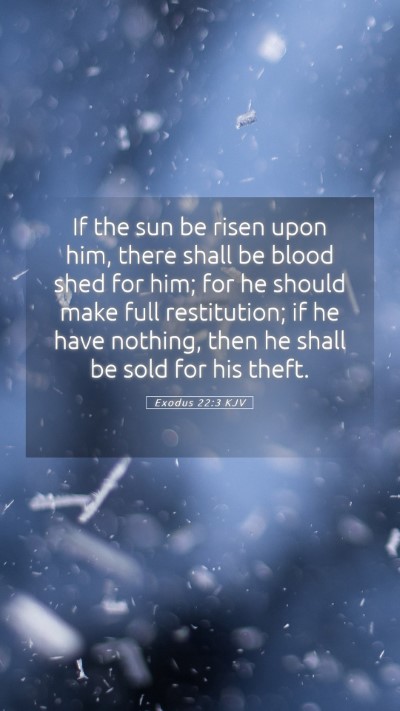Understanding Exodus 22:3
Bible Verse: Exodus 22:3 - "If the sun has risen on him, there shall be blood guilt for him; but if he has been found out, he shall make full restitution."
Overview of the Verse
In this verse, the cultural and legal framework of ancient Israelite society regarding theft and restitution is highlighted. The verse is centered around the principle of justice and the need for restitution, communicating God's expectation for individuals to be held accountable for their actions.
Commentary Insights
-
Matthew Henry:
Matthew Henry emphasizes the moral responsibility that comes with human conduct, especially regarding harm done to others. He interprets this verse as underscoring that the circumstances surrounding a crime can impact the severity of guilt involved. If the thief is caught in the act, restitution is crucial to restoring justice.
-
Albert Barnes:
Albert Barnes provides an interpretation that relates the verse to the concept of intentionality in criminal acts. He notes that the phrase "if the sun has risen" implies a rule of law where daylight represents clarity and awareness. This serves as a reminder that individuals are often more culpable when acts are premeditated or conducted with full awareness.
-
Adam Clarke:
Adam Clarke explains that this verse deals with the principles of justice and restitution in severe situations. He notes that if a person is wounded or if theft occurs at night, the trespasser has an opportunity for escape but is still responsible for subsequent actions if identified. Clarke emphasizes the need for an honest and honorable process in restoring what was wrongfully taken.
Contextual Analysis
The surrounding verses in Exodus discuss the laws given to the Israelites by God, focusing on how to handle theft, loss, and injury. Understanding this verse requires a grasp of the broader historical context of Israel's legal system and the value it placed on community and inter-personal relations. The rules established were designed to cultivate a sense of right and wrong among the people.
Application in Daily Life
While modern readers may not face the same legal repercussions outlined in ancient laws, the principles of accountability, restitution, and moral conduct remain relevant. This verse serves as a guiding principle encouraging individuals to take responsibility for their actions and make amends for wrongdoings.
Cross References
- Exodus 21:18-19 - Discusses the laws of personal injury and accountability.
- Leviticus 6:1-5 - Outlines restitution laws for theft and deceit.
- Numbers 5:7 - Addresses the concept of making amends for wrongs done.
- Proverbs 6:30-31 - Warns against stealing and the consequences associated with it.
Conclusion
Exodus 22:3 provides a powerful insight into the values of justice and restitution in biblical times. By reflecting on this verse and its broader implications, contemporary readers can gain a deeper understanding of accountability and ethical behavior as part of their spiritual walk. Whether for individualized Bible study or group discussions, this verse serves as a significant touchpoint for deeper exploration of biblical principles.
For those seeking deeper Bible verse meanings, this verse articulates essential truths about human behavior and justice. Engaging with bible study resources or online Bible study platforms can further enhance one’s Bible study insights and comprehension of scripture.


